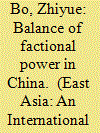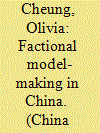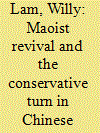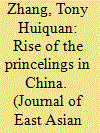| Srl | Item |
| 1 |
ID:
085751


|
|
|
|
|
| Publication |
2008.
|
| Summary/Abstract |
The Seventeenth National Congress of the Chinese Communist Party (CCP), held on 15-21 October 2007 in Beijing, produced some interesting changes to the balance of power among different factional groups in Chinese politics. Compared to the balance of power among factional groups generated as a result of the Sixteenth National Congress of the CCP five years earlier, the four major factional groups had different experiences. In terms of power index, the Shanghai Gang, a factional group affiliated with Former General Secretary Jiang Zemin, declined substantially; the Qinghua Clique, graduates of the Qinghua University, also declined significantly; the Princelings, children of former high-ranking officials, however, increased a great deal; and the Chinese Communist Youth League (CCYL) Group, a factional group closely associated with General Secretary Hu Jintao, witnessed substantial expansion. In terms of group cohesion index, both the Shanghai Gang and the Qinghua Clique shrank significantly; the Princelings increased somewhat; and the CCYL Group expanded substantially.
|
|
|
|
|
|
|
|
|
|
|
|
|
|
|
|
| 2 |
ID:
186939


|
|
|
|
|
| Summary/Abstract |
This article introduces the analytical framework of “factional model-making” to describe and explain the open political contention of Chinese Communist Party elites in the policy process. Party elites undertake factional model-making to express policy disagreements and to signal their power to the regime: by flouting the Party line publicly without punishment, they show that they can influence the Party line and therefore pressurize the regime into acknowledging their position in the opaque power structure. This article chronicles the history of factional model-making from the 1960s to 2012 and examines in detail the making of Henan's Nanjie Village into a re-collectivization model by the Party's left. The process began in the 1990s and ended soon after Xi Jinping came to power in 2012, which prompted Nanjie's patrons to recast the village as a Party model trumpeting Xi's line. The suppression of factional model-making under Xi is discussed in the conclusion.
|
|
|
|
|
|
|
|
|
|
|
|
|
|
|
|
| 3 |
ID:
113765


|
|
|
|
|
| Publication |
2012.
|
| Summary/Abstract |
This paper evaluates the revival of Maoism in China as major factions of the Chinese Communist Party take a conservative turn in ideology and politics. While the changhong ("singing red songs") campaign spearheaded by the ousted party chief of Chongqing, Bo Xilai, has attracted the most attention in and outside of China, power blocs ranging from the Communist Youth League Faction under President Hu Jintao to the Gang of Princelings headed by Vice-President Xi Jinping have also resuscitated different aspects of the teachings and values associated with the Great Helmsman. For this reason, the political demise of Bo does not mean the cessation of the revive-Maoism phenomenon. This study also assesses the impact of the restoration of Maoist norms on aspects of Chinese politics such as the future of political reform.
|
|
|
|
|
|
|
|
|
|
|
|
|
|
|
|
| 4 |
ID:
167832


|
|
|
|
|
| Summary/Abstract |
How have China's princelings benefitted from their family backgrounds in their careers? This study seeks to answer the question and, in so doing, to add to the existing factionalist and meritocracy approaches to Chinese political elites. Based on biographical data of 293 princelings, quantitative analyses show that princelings have various advantages over non-princeling officials on the Central Committee. This is not simply familial advantage, however, as regression analysis finds parents’ rank and longevity do not significantly affect princelings’ career outcomes. Rather, the findings suggest that princelings benefit from membership in an affiliative status group, which differs from factions. The qualitative analysis find princelings’ status is formed and reproduced in a “collective” manner: (1) princelings’ status and early advantages originated in the state's centralized resource allocation system; (2) princelings’ education and career choices are intertwined with the state's practical and ideological goals; (3) princelings’ shared life courses strengthens their collective identity; (4) princelings’ career advantages are secured by the party-state's cadre management system. These factors combine to reproduce princelings’ elite status within the party and state, what I term “collective elite reproduction.”
|
|
|
|
|
|
|
|
|
|
|
|
|
|
|
|